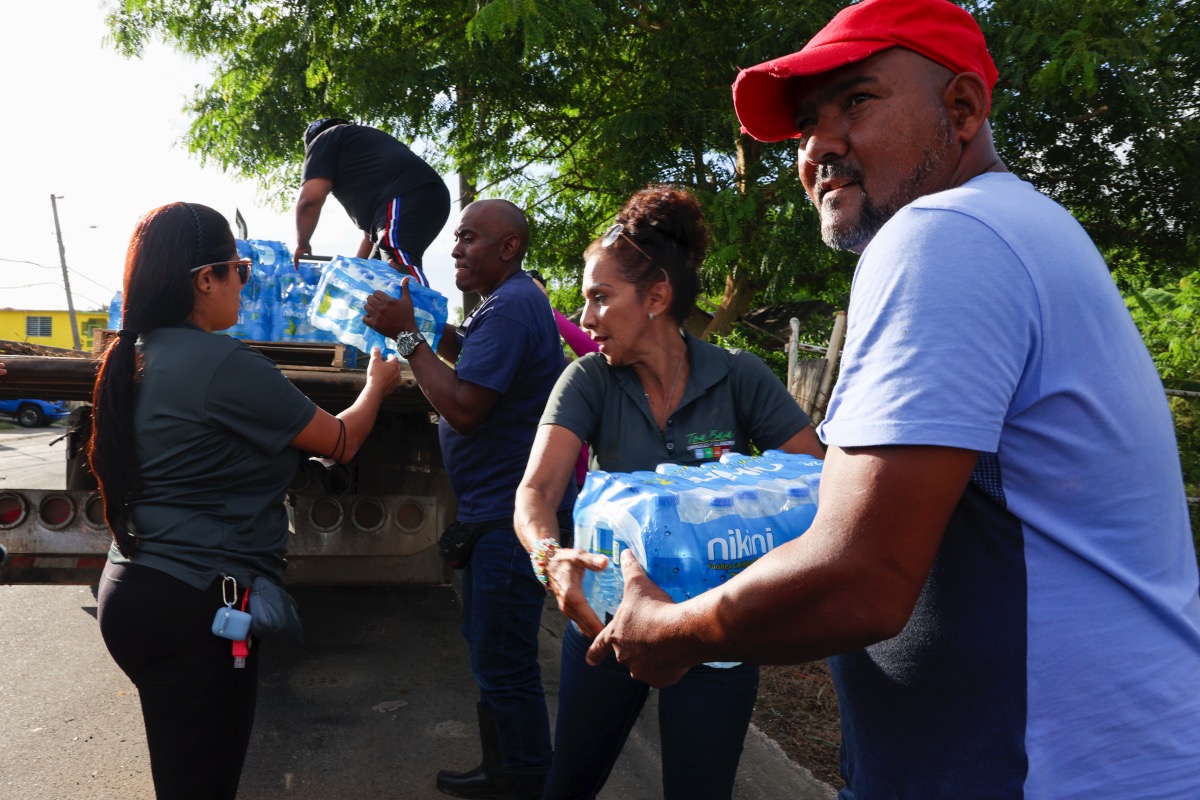

A man collects donated water bottles for drinking after Hurricane Fiona damaged water supplies in Toa Baja, Puerto Rico, Tuesday, September 20, 2022. (AP Photo/Stephanie Rojas)
WASHINGTON — After Hurricane Fiona made landfall in Puerto Rico on Sunday, devastating the island’s infrastructure that was already reeling from the aftermath of Hurricane María five years ago, Congress returned to Capitol Hill on Monday to questions from Latino Rebels about how officials will respond to the crisis in the U.S. colony that has left vast swaths of the island without power or running water.
“We’re going to have to have a supplemental,” said House Majority Leader Steny Hoyer (D-MD) at afternoon votes, referring to the ad-hoc appropriations packages approved by Congress to provide relief in emergencies. “We don’t know what FEMA is recommending at this time, so we have to find that out.”
“We’ve had very little time to assess what’s going on,” said Rep. Alexandria Ocasio-Cortez (D-NY). “We will usually do an emergency supplemental. I think a lot of members invested in Puerto Rico are going to likely have input on figuring out what’s next.”
.@AOC reacts to the crisis in Puerto Rico after #Fiona 🇵🇷 pic.twitter.com/omYGXVUZyn
— Pablo Manríquez (@PabloReports) September 19, 2022
The Federal Emergency Management Administration (FEMA), an agency of the Department of Homeland Security, briefed members of the House and Senate on Tuesday about the extent of the damage officials are seeing on the island, but stopped short of providing a dollar amount that will be needed to rebuild.
“The administration is going to have to ask” for relief aid from Congress, said Sen. Roy Blunt (R-MO), adding there are steps lawmakers can take in the meantime to get the ball rolling on relief. “We can look at what we did five years ago and begin to piece together what would be the beginning of that aid,” he explained.
Lawmakers note that less than one percent of the $13.2 billion in recovery aid allocated by FEMA to Puerto Rico in the aftermath of Hurricane María was actually disbursed on infrastructure projects. The rest went unspent.
Takeaways of the congressional hearing about the recovery efforts of Hurricane María in #PuertoRico 🇵🇷 pic.twitter.com/eTrhnLl1TI
— Cristina Corujo (@cristina_corujo) September 16, 2022
“It’s not clear Puerto Rico on its own has the capacity to spend $21 billion,” said Rep. Ritchie Torres (D-NY), a congressman of Puerto Rican descent who has been active on Puerto Rico policy in the House. “Only the federal government has that level of capacity. FEMA, the Army Corps of Engineers, (the Department of Housing and Urban Development), and (the Department of Defense) should come together and play a more hands-on role in rebuilding the grid.”
Sen. Ted Cruz (R-TX) echoed Torres’ concerns. “Their infrastructure for delivering disaster relief is not nearly as developed as it should be,” said Cruz. “We saw significant relief just not getting to the people last time. Hopefully we’ve learned some lessons and we’ll execute it more effectively.”
Once the Biden administration attaches a dollar amount to a request for hurricane relief, the question becomes how to pass it through Congress. The most obvious vehicle is the upcoming government funding bill known as the “continuing resolution,” or CR, which is expected to pass in October.
Rep. Rosa DeLauro (D-CT) is working with House leadership on a proposal for attaching hurricane relief to the government funding bill, according to two sources familiar with the process. Some Senate Republicans are skeptical that the government funding bill is the appropriate vehicle for aiding Puerto Rico.
“We should have a clean CR,” said Sen. Ron Johnson (R-WI), implying that hurricane funds for the island colony should not be included.
“Look, I’m sure we need to provide hurricane relief to Puerto Rico and the damage,” said Cruz. “As for the particular vehicle or mechanism, I’m sure that’ll be worked out.”
***
Pablo Manríquez is the Capitol Hill correspondent for Latino Rebels. Twitter: @PabloReports



[…] post Congress Awaits Biden Request for Puerto Rico Hurricane Relief appeared first on Latino […]